Forex trading plays a vital role in each international financial market as it allows one currency to be converted to another, thus providing the foundation for global trades and investments.
Nevertheless, because of constant fluctuations in currency markets, sometimes the appearance of an event that occurs globally may lead to profound and often unpredictable effects. These unrests, whether political instabilities, terrorism, or natural disasters, can cause a lot of fluctuations and, therefore, are a chance and a threat to traders.
The effects of global events on Forex trading are of great concern since the market is susceptible and unpredictable; therefore, it requires some understanding to make the right trading decisions.
Understanding Forex Trading
What is Forex trading? Foreign exchange trading, or forex trading, is the act of trading currencies in the foreign exchange market to make profits from the change in the exchange rates.
It’s the largest and most transparent financial market globally, with daily turnover exceeding 7 trillion US dollars. Foreign exchange trading must be explained to individuals entering the market before dealing with how events worldwide influence the same.
The foreign exchange market is open for operation throughout the day and through weekdays, enabling traders to act on the events occurring in other countries. It has a decentralised structure, which makes it sensitive to such things as economic fundamentals, geopolitics, and sentiment.
Key Global Events Influencing Forex
Events around the world have had a significant influence on changing the Forex market and have provided traders with both opportunities and threats. For example, the currency rates can change considerably during election periods as the markets factor in prospective policy changes or shifts in government strategies.
Disasters, like hurricanes or earthquakes in productive nations, bring instability to the economic sector and investor reliability, augmenting volatility for held currencies. Crises such as the COVID-19 pandemic have shown that health crises have high consequences of financial risks and fluctuations within the global markets.
The significant economic fundamentals governing currencies include interest rates and changes in trade policies. Brexit and the trade war between the US and China are recent occurrences that have demonstrated the significance of geopolitical events in determining Forex markets. This factor should attract the attention of traders in their operation.
Political and Economic Factors
Political stability is the cornerstone of currency strength, mainly because power and policy shifts can prompt investor sentiment changes. Strains include conflict or trade war, resulting in high uncertainty that forces investors to move their funds to safer uses, such as dollars or Swiss francs.
The GDP growth ratios, unemployment, and inflation are significant parameters that give insight into the growth of a nation’s economy, and these control the value of the foreign exchange. For instance, when a country increases its interest rates, it brings in foreign investors, increasing the value of a country’s currency.
Strategies to Mitigate Risks from Global Events
Since trading occurs in the Forex market, it’s prudent to adopt sound strategies to address the risks of global occurrences. Diversification is one strategy applied in trading as it exposes traders to many currencies and is not likely to be affected by any market event or movement.
The next one is knowledge, which is crucial since it aids the traders in embracing current events both locally and internationally, as well as analyses of the markets so that they can respond to significant events as soon as they occur.
The incorporation of technical and fundamental analysis enables one to predict the trends that are likely to emerge in the foreign exchange market while at the same time being in a position to determine the factors that are likely to cause movements of the currencies.
Technical analysis centres on price and graphical signals, while fundamental analysis looks into economic and political signals. Some measures include stopping loss, leveraging, and hedging to reduce the impact of unfavourable market volatility on investors.
Charting the Future: Adapting to Global Influences in Forex
Knowing that the world changes constantly, it’s possible to adjust the working methods of Forex traders. Indeed, political, economic, and social forces will continue to play their part in currency markets and require constant strategy changes.
Technology, such as algorithmic trading and real-time data analysis, helps traders have the aid they need when a change in the market occurs.
Also, creating better awareness of the developments in the global environment and having a higher degree of adaptability to trading tactics will play a crucial role in responding to new opportunities and threats.
Steering Through Uncertainty: Mastering Forex in a Globalised World
The complex connection between global occurrences and Forex trading also indicates the need to understand markets and the international landscape.
Currencies also cannot be static because of factors ranging from economic changes and policy formations to wars; traders need to be attentive throughout to exploit a given change to their benefit or protect a given investment.
Trading in Forex in today’s globalised world demands technical proficiency and information on various events and how they can affect the markets.
Thus, forex traders can adopt appropriate strategies and remain alert to manage the risks associated with the fluctuations in the forex market by transforming global challenges into opportunities.




